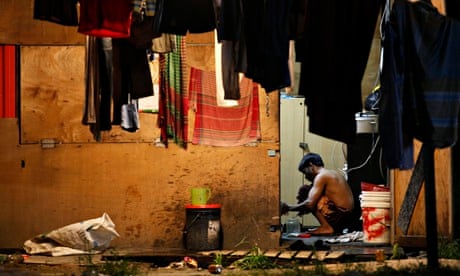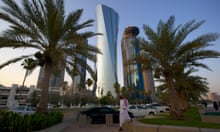The US has downgraded Malaysia to the lowest ranking in its annual human trafficking report, relegating the southeast Asian nation to the same category as Zimbabwe, North Korea and Saudi Arabia. The move could result in economic sanctions and loss of development aid.
Malaysia's relegation to tier 3 in the US state department's Trafficking in Persons (TiP) report – published on Friday – indicates that the country has categorically failed to comply with the most basic international requirements to prevent trafficking and protect victims within its borders.
Human rights activists in Malaysia and abroad welcomed the downgrade as proof of the government's lax law enforcement, and lack of political will, in the face of continued NGO and media reports on trafficking and slavery.
"Malaysia is not serious about curbing human trafficking at all," said Aegile Fernandez, director of Tenaganita, a local charity that works directly with trafficking victims.
"The order of the day is profits and corruption. Malaysia protects businesses, employers and agents [not victims] – it is easier to arrest, detain, charge and deport the migrant workers so that you protect employers and businesses."
According to this year's TiP report – which ranks 188 nations according to their willingness and efforts to combat trafficking, and is considered the benchmark index for global anti-trafficking commitments – trafficking victims are thought to comprise the vast majority of Malaysia's estimated 2 million illegal migrant labourers, who are sent to work in the agriculture, construction, sex, textile or domestic labour industries.
Many of the victims are migrants who have willingly come to Malaysia from neighbouring countries like Indonesia, Burma, Cambodia and Bangladesh, attracted by Malaysia's large supply of jobs and high regional wages. But once in Malaysia they fall prey to forced labour at the hands of their employers, recruitment companies or organised crime syndicates, who refuse payment, withhold their documents or force them into indentured servitude.
"The Malaysia government has continuously failed to provide basic rights protections to migrant workers and instead has created a system where unscrupulous labour brokers, corrupt police and abusive employers can have a field day," says Phil Robertson, Asia's deputy director of Human Rights Watch.
Refugees are particularly vulnerable to trafficking within Malaysia's borders, the report states, as the government does not grant them formal refugee status or allow them to work legally. As a result, many of the 10,000 refugee Filipino muslim children who reside in the Sabah region are subjected to forced begging, while reports of abuse, detainment and torture by Malaysian traffickers of Rohingya Muslims fleeing persecution in western Burma made headlines earlier this year.
"When you Google 'Malaysia', it's among the five worst countries for refugees," said Lia Syed, executive director of the Malaysia Social Research Insitute, which supports refugees. "There is no policy for refugees in Malaysia at all. They are not recognised, they do not have legal status, they are just considered illegal migrants. It doesn't matter what country they come from, what their story is, they do not get any support officially from the government."
Malaysia's downgrade to tier 3 is an automatic relegation after four years on the tier 2 watchlist and it is the third time in seven years that the country has sunk to the lowest ranking.
The downgrade is likely to be seen as a considerable blow to Malaysia's image and is sure to strain diplomatic relations. Malaysia is a strategic US partner in President Barack Obama's "pivot" to the east, with the US serving as Malaysia's largest foreign investor and fourth-largest trading partner.
The downgrade could spell economic sanctions and restrictions on US foreign assistance and access to institutions like the World Bank and International Monetary Fund. However, such punishments can be waived under national security considerations.
While Malaysia has increased its preventative efforts against trafficking via public service announcements, there were fewer identifications of trafficking victims, fewer prosecutions and fewer convictions this year than in 2012, the report stated, with poor victim treatment posing a "significant impediment" to successful prosecutions. Authorities not only failed to investigate cases brought to them by NGOs, they also failed to recognised victims or indications of trafficking, and instead treated cases as immigration violations. Some immigration officials were also accused of being involved in the smuggling of trafficking victims, yet the government did not investigate any such potential individuals or cases.
"Unfortunately Malaysia's victim care regime is fundamentally flawed," said Luis CdeBaca, the ranking state department official for combating trafficking. He pointed to Malaysia's use of detention centres for people, mainly young women, identified as having been trafficked into the country for illegal purposes.
"Malaysia has a strong focus on getting rid of illegal aliens rather than a progressive compassionate response to its many victims of trafficking. There has been lots of promised future action but no signs of things happening on the ground to deal with their significant problems," he said.
Key recommendations issued by the US included amending the current anti-trafficking law to allow victims to travel, work and reside outside government facilities, and increasing efforts to investigate, prosecute and punish any public officials who might profit from trafficking or exploiting victims.
Malaysia's deputy home minister, Dr Wan Junaidi Tuanku Jaafar, said earlier this year that the country was in a "very difficult position" as it knew it needed to increase trafficking victims' rights, yet it didn't want to encourage illegal migration to its borders.
"If we allow these people to start working, everybody will start coming here," Wan Junaidi told reporters after a conference on human trafficking.









